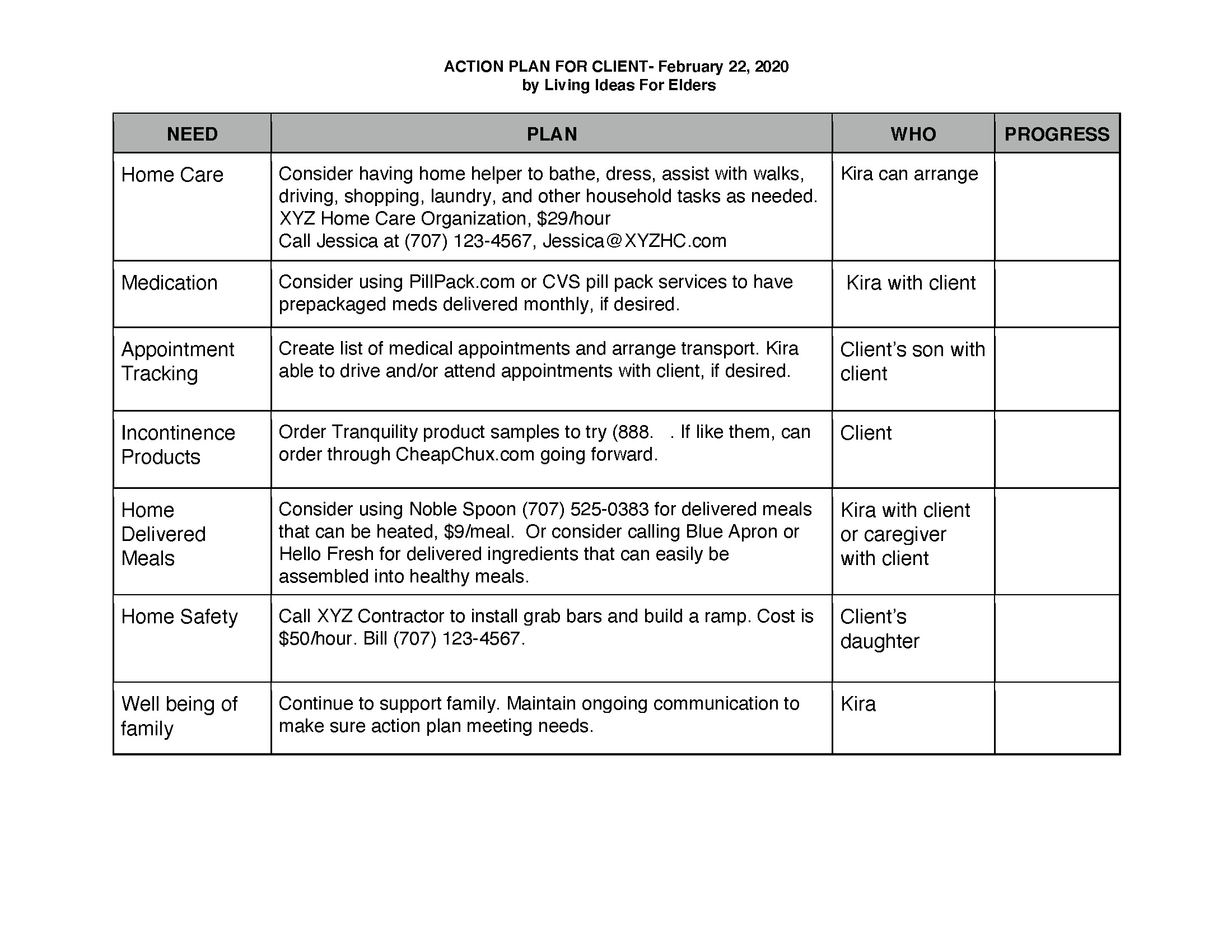By: Kira Reginato | Posted: March 25, 2020 | Updated: April 5, 2023
Editorial Introduction
Over the years we have noticed that many of the older adults and their families with whom we talk are unaware that such as thing as a Care Manager exists.
Yet such people are founts of knowledge, and can be exceptionally helpful when a sudden need to become an expert on helping aging parents is thrust upon family members.
As part of our series on “getting expert help”, we asked Kira Reginato to write this article about what Care Managers do, why you might want one, and how to find a good one. Kira is herself a Care Manager; has had a radio show on aging; and has published a book on helping your aging parents, and an App to help with that process. See Kira’s profile here.
What Is A Geriatric Care Manager (GCM)?
If you needed a dentist, you’d know how to find one, right? But what if you need an expert with aging issues, where do you turn? Consider a privately hired geriatric care manager, also referred to as an eldercare consultant, care manager, or a case manager.
According to AgingLifeCare.org:
“An Aging Life Care Professional, also known as a geriatric care manager, is a health and human services specialist who acts as a guide and advocate for families who are caring for older relatives or disabled adults.”
What Does A Geriatric Care Manager Do?
A care manager will often begin working with a family when an older adult has cognitive decline, mental health issues, or complicated health issues they are not able to manage. The family needs assistance to navigate available resources and move forward.
Care managers kind of act as a project manager or architect. The family tells us what they want things to look like and we add that to our assessment findings. We know the good subcontractors and costs and can help the “house” come together more quickly and better than if a family goes it alone.
People don’t know care managers exist or what we do, BUT when they do find us and work with us, they report being absolutely grateful. The recurrent comment we get from families is: “I wish we knew about you a year ago! We would have made very different decisions.”
The majority of people who call us are adult children. They are getting the frequent phone calls from mom or dad and doing the best they can to address each concern as it arises, but they are out of their depth to solve each issue and there is no end in sight to the growing list of needs.
I’ve run my solo practice as a care manager for 12 years and I did a radio show on elder topics for five years, so I’ve had the benefit of sitting down weekly with industry experts and learning from them.
Each care management firm has a different process so they are different from mine, but I’ll tell you what I do:
Most of the time hiring a care manager begins with a phone call, often by the oldest adult daughter. She inquires about what I do, how I help, and my fees. This intake call is done at no charge. During this call I hear from her what is going on and she gives me a brief history of health concerns, finances, legal and safety concerns, etc.
If we decide to work together after the intake, I usually schedule a meeting with her and the other siblings to allow them to speak candidly before meeting with the older adult. Or, sometimes I schedule my home visit with the adult children and the parent all at once, it all depends on what would work best for each family. My preference is to meet with adult kids first so we can figure out the best approach for moving the parent towards healthy solutions.
Then I meet with the parent and explain I’m an expert in finding resources and guiding families as a person gets older. I know what things cost, how to access them and am able to prioritize what area of concern could be worked on first. I’m also available for them to share thoughts and worries they might not be sharing with their family. When I walk into the home, the older adult often understands that it’s time to get serious about taking action because this meeting about the business of aging is formal and being addressed by a professional.
After our meetings I can write a “care plan” to map out each step to take. I call my care plan an “action plan” since that resonates better with families. An action plan serves as the blueprint for moving the family forward. The action plan helps get the family organized and they feel better having a plan. They have often been stuck, worried and pushing parents who won’t do even one item.
A GCM can be hired to do some or all items on the action plan or simply act as the catalyst or monitor of the plan. The action plan is a living document which can be added to or edited at any time by anyone helping their parent.
Example of an Action Plan

Qualities Of A Good Care Manager
You may need to work off and on with a GCM for years, depending on your situation. Some clients I see weekly, some monthly, some I see once for the initial consult and not again. Regardless, find a person with whom you can develop rapport and begin to trust. You want to respect their guidance and have confidence in the advice you are being given along the way.
You want to look for a GCM that sets good boundaries. The eldercare journey can be overwhelming and families often feel adrift. It’s important to have a professional who is strong and shows healthy limits. In effect, when a care manager sets good boundaries and follows through, s/he is modeling how the family should or could be taking care of themselves and the situation.
Feel free to speak to several CGMs before you decide on one. When someone calls me and I know they are just starting their search, I offer to provide two colleagues’ contact info. That way they can hear three voices and get a feel whom might be the right person for THEIR family. I may not fit.
Feel free to ask for a professional reference or two, that way you can ask another family how it was to work with the person/firm you are thinking of hiring.
Another way to look for a good care manger is to ask if they are certified and ask about their background. GCMs frequently have a social work or nursing background but there is no requirement per se in order to become a care manager. The industry now offers the ability to sit for an exam after work experience to get “Care Manager Certified.” That can give you the reassurance that you are working with a knowledgeable professional. That said, it’s not required.
Another way to ensure you are working with a competent professional: are their answers concrete or vague? Is the care manager answering you in a complete, understandable way? You want to work with a clear communicator and someone who knows the eldercare industry inside and out.
Do you sense they are fully listening to you or do they seem rushed? I have families report that they feel so much better after we speak during the intake call. Many times I have hardly said a word. People need to say what’s going on, how hard things are, how helpless they feel; they don’t just want the issue “fixed” without compassion. This job requires both knowledge AND heart.
Questions To Ask A Care Manager
As with most industries, I believe a critical question to ask is “How long have you been doing care management?” The more experience the better!
“What is your specialty?” In other words, what type of older adults do they most often serve? You want to work with someone who has a lot of experience with your type of elder situation, be it dementia, mental illness, medical frailty, or a disabled adult, etc.
“What is your response time?” If you text, email or phone, how long before you can expect to get a response? I find that families want to reach me right away, or at least the same business day. That’s because they are busy and have things they need to do; they prefer to quickly get answers, not wait 24 or 48 hours for a call back.
“How big is your firm?” It’s good to know how many staff you might be working with over time. It can be stressful to have a GCM you enjoy working with and knows your full story but then other staff is filling in for them or switching visits with them often.
Who Pays?
You do. The person who hires a care manager pays him/her, not an insurance company nor Medicare; unfortunately. I have heard that some long-term care insurance companies offer a GCM service but have not yet seen that in action, other than a one-time home assessment. The beauty of a private care manager is that we can come into your life, address concerns and get things settled, but then when the next issues arises, can re-enter your life and help anew. We don’t have to visit for a set period. We decide together what would work best, what can be afforded, etc.
In our area of the country, Northern California, I’d say the going rate is $125/hour and up. If money is a concern, I offer to work a certain number of hours and inform the family when I’m nearing that cap. I can then be asked to add more hours or stop. Feel free to ask any potential care managers for a copy of their Care Management Agreement so you can see their scope of services and fees.
Examples Of How A Care Manager Helps
A family of four was worried about their parents because mom was caring for dad and he was falling, his needs were increasing and she was not letting any paid help enter the home. I met with the couple after meeting with the siblings and recommended an excellent home care organization with a strong male caregiver and they hired him. He started with a small amount of hours until the wife grew more comfortable (in giving up some of her guarded role) then added more time. I remain on-call for other issues as they arise and the family needs guidance again.
An adult daughter’s mom was mentally ill and the daughter was putting herself through school and fielding myriad calls from her mother saying “I have no water” and other made up statements that caused the daughter to come running. That client now receives regular visits from me and in five years, has had no psychiatric incident nor hospital stay, and is cared for in an affordable care home. This has allowed the daughter to get married and have children and work full time rather than be her mother’s full-time caregiver.
A man with worsening dementia was refusing to let home care come into his home to help after his wife died. His sons were concerned as their dad lost weight, didn’t take his medication as prescribed, was not able to prepare meals. He needed care and I was able to introduce a private caregiver and increase care hours over time. When he no longer could agree to open the door to his caregiver, we moved him into a memory care community. I now visit monthly to check on this client’s welfare and give a report to the sons.
If you’re involved with eldercare concerns or expect to be, I recommend at least one meeting and maybe the home visit with a care manager. That assessment and guidance can be invaluable in future decision making. You want to head in the right direction to start with — and you can’t know what you don’t know.
How to Find One?
To find a care manager, go to the website of the Aging Life Care Association (www.aginglifecare.org) or ask an attorney, fiduciary, hospice, nurse, or doctor for a recommendation.
References
- Aging Life Care Association: The Professional Body for Care Managers in the USA.
Kira’s Book and App
The Book
Get Kira’s book: Tips for Helping Your Aging Parents (without losing your mind)
The Caring “App”
- View The Caring App, in Tech-enhanced Life’s database of “Useful Resources and Products”.
*Disclosure: The research and opinions in this article are those of the author, and may or may not reflect the official views of Tech-enhanced Life.
If you use the links on this website when you buy products we write about, we may earn commissions from qualifying purchases as an Amazon Associate or other affiliate program participant. This does not affect the price you pay. We use the (modest) income to help fund our research.
In some cases, when we evaluate products and services, we ask the vendor to loan us the products we review (so we don’t need to buy them). Beyond the above, Tech-enhanced Life has no financial interest in any products or services discussed here, and this article is not sponsored by the vendor or any third party. See How we Fund our Work.

